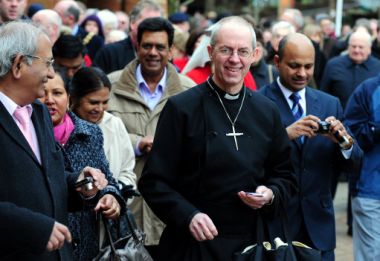Religious programmes shouldn't just be at Easter and Christmas, says Welby

The Archbishop of Canterbury Justin Welby has called on broadcasters to allot more time for religious programming throughout the year, not just at Easter or Christmas.
Writing in the Radio Times, Archbishop Welby said that as religion is part of everyday life for many people, religious broadcasting is "vital the whole year round".
"Christians believe that the risen Jesus reigns over all of the world – not just in religious buildings or during Christian festivals, but at all times, everywhere," the Archbishop wrote.
He praised the way many programmes, such as BBC 2's The Choir, and Channel 4's coverage of the Muslim holy month of Ramadan, handled the subject of religion.
"At a time when some argue that faith and religious life should be kept behind closed doors, it is reassuring that broadcasters still invest in imaginative, high-quality religious programming," he said.
In particular, he spoke of how he enjoys the comedy series 'Rev', starring Olivia Coleman and Tom Hollander, describing it as "great entertainment".
"The show amusingly depicts some of the challenges facing clergy up and down the country," the Archbishop noted.
But he contended the dwindling congregation it depicts is not an accurate reflection of the whole Church.
"I have a friend who runs a growing church in Reading city centre, filled with young people with no church background; I have another friend who has had to plant two new churches because his congregation is bursting at the seams," he said.
"Other churches have few people but great impact, again with visionary and inspiring leadership. As with all of life, the picture is complex, but I see plenty of struggle and plenty of grounds for celebration."
Broadcasters such as the BBC have come in for significant criticism in the past from secularist lobby groups who argue that religious groups should be stripped of their privileged positions in programmes like 'Thought for the Day', 'Songs of Praise', and 'The Big Questions'.
There have also been complaints from religious groups who feel that religious programming is too often simply used to cause controversy, as happened on Good Friday in 2013 when Melvyn Bragg presented a programme that used Gnostic Gospels to argue that Jesus had a sexual relationship with Mary Magdalene.
The Archbishop argued that religious programming had a place all year round, because God is not just interested in the "the 'religious' bits of life".
Pointing to Easter, Archbishop Welby noted how the events of Jesus' trial, crucifixion and resurrection "remind us that God is intensely engaged with the world he created".
"This means that we should not be surprised to find God at work in unexpected ways and in unusual places."
Rather than being a form of escapism, Archbishop Welby quoted Ian Hislop in saying that religious programmes were about trying to "engage with the world, rather than just trying to escape from it into the next".
This is not the first time that Archbishop Welby has used Easter as an occasion to talk about the importance of religious television.
In 2013, also writing in the Radio Times, he praised the way in which religious programmes can promoting better inter-community understanding, saying that such programmes were the real "reality shows".
"For adults over a certain age who received little in the way of religious education at school – especially of an inter-faith variety – religious broadcasting is likely to be their best guide to the different faiths, not just of the people they see on the news but of the people they meet at the school gates, or queue next to at the post office.
"It's essential that we support broadcasting that teaches us about those around us. Telling stories about ourselves and others, in a way that celebrates the full scope of what it means to be human: that for me is what makes a reality show."
The Archbishop's comments come as he urged people to nominate their favourite examples of religious broadcasting in the Sandford St Martin Trust Awards.
This year's television shortlist includes Rageh Omaar's 'The Ottomans: Europe's Muslim Emperors', Simon Schama's 'The Story of the Jews', Channel 4's 'A Very British Ramadan', and 'Wells', from BBC 4′s 'Cathedrals' series.
There are also radio entries including 'A Road Trip to War' from the BBC Asian network, following a group of British Muslims transporting aid to Syria, and 'Mrs Livingstone I Presume', a work looking at the wife of missionary David Livingstone, from Premier radio.
Chairman of the Sandford St Martin Trust, Bishop Nick Baines said of the importance of religious programming: "The media are vital in shaping how we see and understand the world. This brings huge responsibility and challenge, particularly in relation to how matters of religion and faith are represented."
The award's winners will be announced on June 3 and will share £10,000 in prize money.











